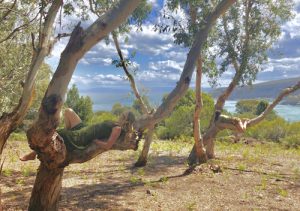A few weeks ago I showed an interior wall photo of my home that displayed three works of art. The smallest of the three pieces was ‘Waratah I’ by photographic artist Lucia Rossi.
I have this in my home because it serves to act as a religious icon of the sacredness of the human body and is as deserving of admiration and prayer as any Russian icon of a favorite saint.
Many of my blog entries are about the importance of understanding how we humans are inextricably linked to the great web of life that is this earth; that the human animal — whether through DNA sequencing or evolutionary traits — is connected intimately, biologically, emotionally and spiritually to everything; that our bodies are nothing if not a walking sacredness.
Our human body is as full of mystery and magic as is any life form. Its complex machinery deserves our collective awe, respect and gratitude for functioning as it does over the course of many years.
On Sunday I returned from a hospital stay of four nights for surgery to help me keep functioning for a few years to come. The details aren’t important. What is, though, is the visceral experience I had that made me even more appreciative of my physicality even as this animal body of mine expressed its limitations through a bit of pain.
While recovering in hospital, instead of a beautiful, red waratah flower protruding from my pudendum as in the Rossi photograph, I had a three-way catheter connected to a penis that bled. Both, however, are majestic works of art and science. Both are mythic and symbolic as they each expressed an aspect of life in a truthful manner.
Hidden in language, though, is a disturbing issue because the common medical term for the female and male external genital area is “pudendum” (plural, pudenda) and comes from the Latin pudere — be ashamed. What does this say of our culture when its medical terminology links the genital area with a place of shame? (The ‘um’ part of pudendum means place; as in gymnasium, planetarium.)
With our mythical Biblic account of Adam and Eve leaving the garden of Eden covering their genitals, is it any wonder that sexual dysfunction is entrenched in the Judaeo/Christian/Islamist religious institutions?
In contrast to the written word, what I found very wonderful — and hopeful — about the experience of being in hospital was the way the female nurses treated “my” pudendum with respect and compassion; certainly not shame. In their handling of me, there was never a hint of embarrassment or sense of repugnance. In the bed where I was looked after, the idea of “original sin” was replaced by “original blessing”.
Courbet’s “Origin of the World” is a very powerful testament of how art can portray an aspect of our physicality not shrouded in guilt or hidden from view.
We have all entered this world through the portal of the vagina. There is nothing shameful about this. It should be celebrated.






You must be logged in to post a comment.